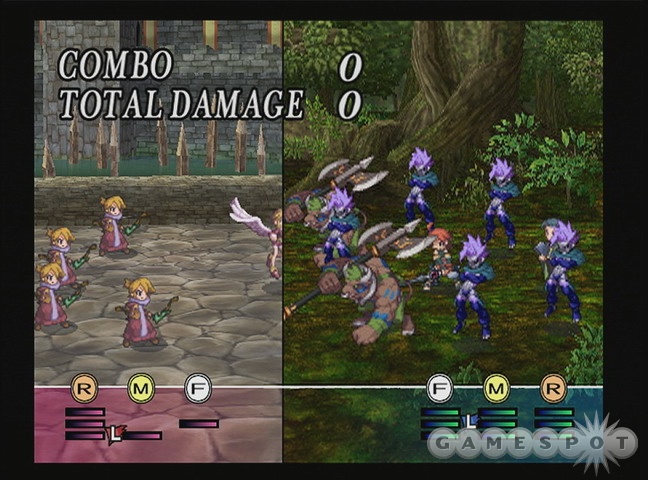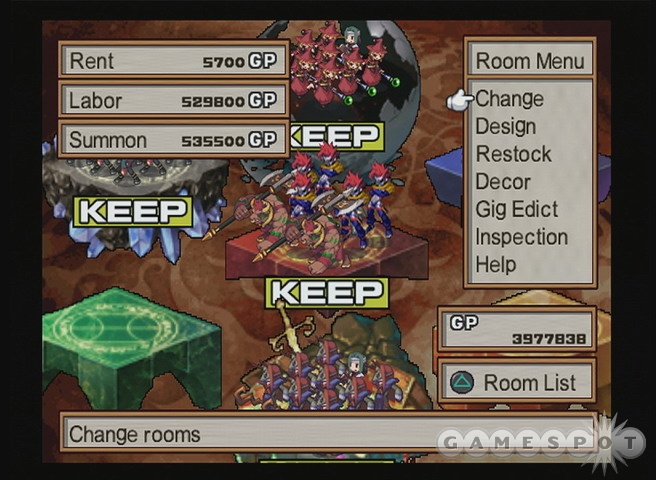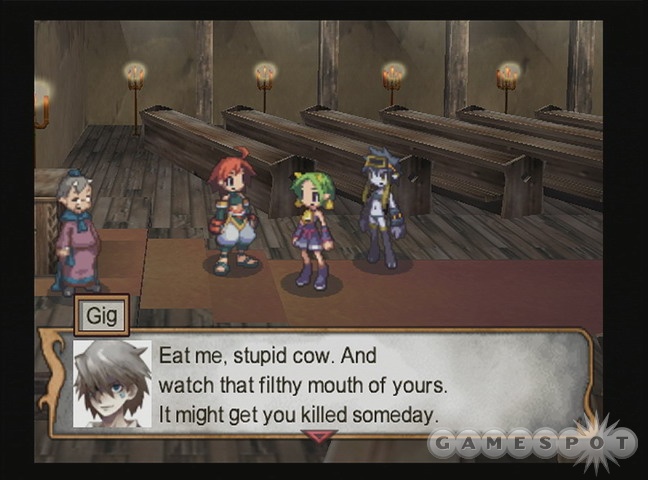Two hundred years after Master of Death Gig's near-destruction of the world, his three monstrous world eaters are poised to reawaken and continue their rampage. Ironically, only Gig's power is great enough to destroy them, and so his soul--previously sealed within an onyx blade--is fused with your own. The power of a god is now within your grasp, but Gig and his desire to bring about the end of everything is ever present. Such is the plot of Soul Nomad & the World Eaters, the latest strategy role-playing game to come from Nippon Ichi Software. Unlike its predecessors, Soul Nomad plays out much more like a mash-up of Ogre Battle: The March of the Black Queen and the Fire Emblem series with that traditional Nippon Ichi flair thrown in for good measure. While it certainly does not lack the depth and complexity of the Disgaea titles, Disgaea this is not. The end result is a strategy RPG that manages to correct most of the issues present in its precursors, features an original battle system, and is still jam-packed with irreverent fun.
One of the first things you will notice is that in combat, the isometric perspective so often associated with the strategy RPG genre is gone and replaced with a flat 2D, top-down view. In Soul Nomad, you battle across a large outdoor map that is subdivided into the usual grid-based layout, something that makes each battle seem much more vast and epic than the smaller, more localized combat in many other similar games. Each square is associated with a terrain type that can affect your squads by providing attack bonuses and movement penalties.

Wait, squads? Yes, much like the aforementioned Ogre Battle, Soul Nomad features squad-based combat rather than individual unit brawls. The source of much of the game's customizability lies in creating each of these squads and tweaking them for maximum efficiency. Each squad is associated with a room, which is a 3x3 grid that serves as its home and has a limited number of positions available in which to place units. Throughout the course of the game, the number of rooms you can have at any given time, the number of positions that can be open in each room, and the number of room types you have available to choose from steadily increase. Each room has a built-in bonus called a decor, which can do anything from increasing defense by a percentage to turning the squad into a walking time bomb that explodes after three turns. Each room can be further customized with your own decors for up to a total of four per room.
Rooms can be changed at will, though the system for doing this can be incredibly frustrating at times--they are randomly generated, and each room has a randomly generated number of positions. So late in the game when you want to have a specific room with nine open slots, it becomes nigh impossible to pull it out of the hat without a huge time investment and a lot of luck. To further complicate things, you can't change individual rooms but must rather change every room simultaneously. It's possible to lock specific rooms you're already finished with so they're left alone, but you are only given a limited number of locks. Generally, you're only short one lock from eliminating this problem entirely, but there are a couple of times in the game when you've got two or more unlocked rooms.
The units that you form squads with in rooms are as varied as you may have come to expect from earlier Nippon Ichi games. As you progress throughout the game, more than 25 unit types are unlocked, each of which has unique attacks and is weak or strong against other unit types. Positioning within squads is an important factor because each unit has a different attack depending on whether you place it in the front, middle, or rear rows, and units in the rear row are less likely to be hit by physical attacks. It's generally a bad idea to put spellcasters in the front row because they're more likely to be hit and have fewer hit points; likewise, melee units usually can't attack from the rear.

Combat is fairly straightforward as per the genre, but not without its own unique twists. Battles always begin with your hero's squad placed on the map. At any time, you can summon other squads by paying a fee and placing them around you. Each squad takes turns moving around the map and either attacks or uses map abilities called tactics that provide temporary stat boosts or deal damage to enemies. The attacking team almost always strikes first and then the defending team retaliates with a counterattack.
Unfortunately, while you get to select which squads will fight which enemy, you never get to select which individual units will attack an enemy, instead relying on the artificial intelligence to pick for you. Most of the time, this will do the job, but sometimes, you're left scratching your head and wondering what the computer was thinking. Squad movement and damage costs it stamina, which affects attack damage, as well as accuracy. Once stamina is lowered past a threshold, the squad is able to follow up its normal attack with special attacks based on the types and numbers of units that compose it. Battles are where the vast majority of your time is spent, and typical of most strategy RPGs, much of the game's story is told amidst the confusion of the battlefield.
Throughout the game's 45 or so campaign battles, you will encounter a huge variety of characters that will join your group or fight against it. Many of these story characters, such as the fleet-footed but dull-headed brawler Levin, fit into one of the standard unit archetypes, albeit they are quite a bit stronger than their peers. But occasionally, you'll encounter an entirely unique unit, such as the mysterious gunslinger with a Robin Hood-complex Endorph or the protagonist, whose name and gender you choose at the beginning of the game. The undisputed star of the game, however, is Gig himself, the foul-tempered, trash-talking Master of Death riding shotgun in your body. Though he's generally in no position to really do anything, it doesn't stop him from saying what he thinks and making fun of everyone with lines like, "She makes me want to punch kittens." Often, you'll be eager to play more just to see Gig's next razor-sharp witticism against his favorite verbal punching bag Danette, the hero's childhood friend who takes being bad with names to an entirely new level. She can't even remember yours!

Minor antics aside, Soul Nomad is a heavily plot-driven game that, unlike previous Nippon Ichi games, manages to successfully balance its humor with a serious story. Gone is the non sequitur wackiness of Disgaea, such as midbattle-delivered pizzas and wandering prism rangers. As is characteristic of Nippon Ichi's games, the localization and voice acting is top-notch. The original Japanese track is also thrown in for those who demand to hear it in the original language (you know who you are).
Between battles, you will manage your growing army and travel across the world map, interacting with citizens in the various cities you encounter in a variety of ways. Throughout the game, you will purchase and be rewarded with items known as Gig Edicts that you can use in town to recruit townsfolk into your army by kidnapping them. You can absorb them into yourself for various stat enhancements and even provoke them into fights so you can steal their cash once you've trashed them. You can also level up your rooms and increase the strength of their inherent decors by performing a Gig Inspection. This creates a randomly generated dungeon with an arbitrary selection of enemies and ability bonuses or penalties. Performing inspections is a great way to gain extra levels and cash but is entirely optional because Soul Nomad, unlike its predecessors, is well balanced to the point that excessive grinding is unnecessary. Perhaps the worst thing that can be said of Soul Nomad is that its in-game tutorials on many of these finer points are spotty. Combat is fairly well explained, but such things as room creation, Gig Edicts, decors, and the strange Bad Vibes that occasionally show up are not. To fully master the game, a large amount of experimentation is required.
Visually, Soul Nomad is more similar to GrimGrimoire than Disgaea. The art style is still anime-influenced, but the out-of-proportion characters have been replaced with much more realistically looking designs, and extended conversations are often accompanied by super high-quality character art. The battle sprites are also extremely well detailed and animated, though they are in slightly lower resolution. This is, however, out of necessity for the number that appear onscreen at any given time and the complexity of their attacks to maintain a constant framerate. The various special attacks you gain access to fill the screen with unique and brightly colored animations, and are easily the highest point of the battles. These will, over time, become tiresome because they can take upward of 30 seconds to play out, but it is possible to turn off extended battle animations from the options menu, cutting down individual fights to mere seconds.
As previously mentioned, the voice acting is exceptionally well done, with only one or two relatively flat performances out of a cast of dozens. Gig's voice in particular manages to convey the perfect mixture of arrogance, outrage, and aloofness you might expect from an imprisoned demigod. Most of the other characters also manage to sit on even footing with him. Each unit type has one or two sound effects associated with it, which in battles--with copious amounts of the same types of squads--do tend to wear on you, but overall this is a minor complaint. Musically speaking, the sweeping orchestral arrangements and lyrical chanting so common in RPGs is bolstered by a variety of other styles, but all too often, the superlative voice acting makes the background music seem commonplace.

Finally, as with all of its strategy RPGs, Nippon Ichi has added huge amounts of replayability to the game. Upon completion of the standard game campaign with one of the many endings--there is a paired ending with nearly every story character which may be different depending on your gender--you are given the option to start the game over again with your army as it was for additional playthroughs. New rooms and units are unlocked, as is an optional “demon path” campaign that lets you fully embrace your dark side, features a completely new story, and adds an additional two endings. This extra story adds an additional ten to twenty hours of Gig on top of the normal campaign’s forty-hour or so game and gives you a frightening look at what the world would be like if you took another path. Beyond that, there are still high-level Gig Inspections to challenge you for countless more hours.
Soul Nomad & the World Eaters is a fun and welcome departure from the formula that Nippon Ichi has come to rely on for the past four years. The amount of customization available is impressive and will appeal to the hardcore audience who strives to build the perfect army, while still allowing relative newcomers to this sort of game to enjoy themselves. Fans of the strategy RPG genre would do well in picking up a copy of Soul Nomad, which like the Disgaea games offers nearly limitless replayability. And if you’re new to this type of game, Soul Nomad, despite its inconsistent level of instruction, is a great way to pick up a new addiction.